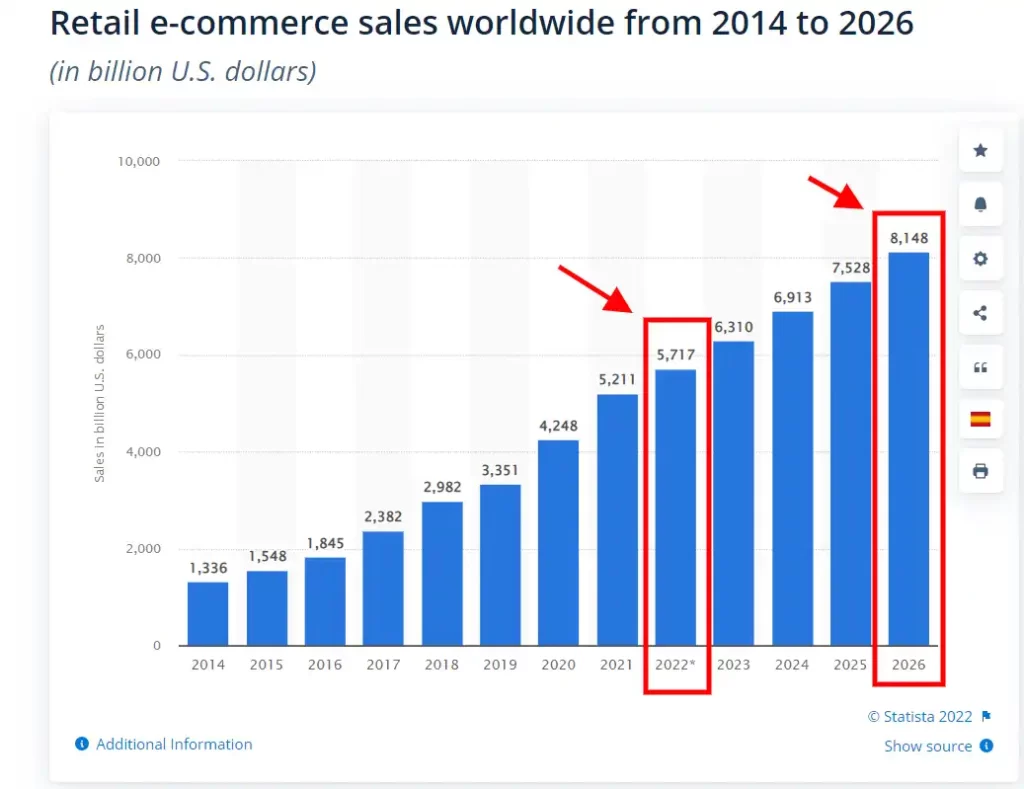
Did you know that in 2022, global eCommerce sales accounted for 5.7 trillion US dollars? As per Statista’s report, it is expected to grow to 8.1 trillion US dollars by the year 2026.

However, with the increase in global eCommerce sales, the number of online shoppers abandoning their carts also grew. Almost every US eCommerce business owner is making a better customer experience a top priority. But, it’s complex to get the consumer experience right with the change in users’ habits and in this ever-changing world of websites, mobile apps, and online shopping. Hence, Quality Assurance of eCommerce business channels is a vital step to ensure its growth and development.
A Quality Assurance expert keeps a technical eye on the entire performance of an eCommerce website. It ensures that all features and functionalities of eCommerce stores work flawlessly in all conditions. With the help of a series of tests, you can identify the problematic areas and scope of improvement at any stage of your eCommerce business.
Quality assurance eCommerce is an integral business element to achieving excellent performance in terms of functionality and usability. It avoids flaws and serves end customers with superior products making them happy.
Revolutionize Your E-commerce Businesses With Quality Assurance
– It helps in building a stronger business reputation, further leading to the company’s growth.
– It investigates the potential mistakes and problems associated with eCommerce systems.
– QA eCommerce systems ensure that the end users are getting the best eCommerce or shopping experience.
– Quality assurance tool provides smooth compatibility among various devices to gain a competitive edge in the industry.
There are plenty of other aspects in the eCommerce domain where Quality assurance can turn out to be a game-changer. For a better understanding, let’s check out some of the eCommerce problems and how QA solves most of them.
Common Challenges With eCommerce Businesses
Cyber & Data Security
Nowadays, top-notch website security is a crucial and growing trend for eCommerce websites. With more and more cyber threats and malicious agents active online, you should ensure adopting the right security practices. Keep HTTPS (HyperText Transfer Protocol Secure) on the website to safeguard personal and sensitive information. Users also feel that their credit card details, phone number, etc. are safe with the company. In addition, a data backup is a must to be ready for any future technical issues.
Compatibility Issues Across Browsers
In a US eCommerce business, the customers are likely to use multiple browsers for opening the website and shopping for products. Thus, website compatibility is one of the essential factors for business success. It should be accessible on multiple browsers and devices without any hassle. Study your audience and set the device choices to avoid any future glitches.
UI/UX Issues
The world is shifting from desktop to mobile, and so should your online eCommerce business. You should be focusing on maintaining mobile-friendly websites or mobile apps for customers’ shopping ease. While building mobile-friendly websites, consider the right practices of UI/UX design that include fitting content on small screens, easy clicking, and more.
Website Speed
As they say, website speed can make or break your business, and the same applies to the eCommerce industry as well. As per reports, web pages that load within two seconds possess an average bounce rate of 9%. However, the same bounce rate statistics rose to 38% when the page load speed increased to five seconds. No customer is going to wait if the loading speed is slow. So, it is highly advisable to maintain optimal website speed for avoiding major revenue and client losses.
Role Of QA Automation In Addressing These eCommerce Issues
Use Of Real-Case Scenarios
The QA analysis can understand the website performance in comparison to the ideal or optimal standards. You can use real-case scenarios to test the website and curb user acceptance testing in the long run.
QA Implementation With SCRUM Framework
Add SCRUM framework to improve the productivity levels of the website and manage product development as well. It is a definitive move to get your online eCommerce getting accustomed to ever-changing market dynamics.
Live Website Surveillance & Monitoring
Run effective monitoring practices on the website with the help of Google Analytics. Keep collecting real-world data to identify the growth scope and next actionable moves. Keep a keen eye on the sudden drops in eCommerce transactions, user traffic, browsers, operating systems, and other parameters.
Issue Reporting & Regression Testing
Perform regression QA testing on the website for identifying potential defects and growth areas. Include RTM (requirement traceability matrix) sheet, test scenarios, test cases, and map requirements for quality testing and analysis.
Architecture Mapping & Documentation
Run tests at the initial stages of eCommerce website development to identify and deal with potential issues. Plan your actions to save your time and money in reducing production issues.
Final Comments
Hence, on a final note, we can say that quality assurance plays a vital role in defining the systematic approach in the eCommerce industry. The QA tests ensure that the store products should be available for the right targeted audience and meet customer expectations. Nowadays, a large section of eCommerce companies are looking up to the Quality Assurance department for preventing errors and achieving business growth.
At Zorang, we provide state-of-the-art QA and Automation services to prepare your eCommerce store for new growth milestones. We bring the manual as well as automated methodologies to keep your online store and products always ready to serve the targeted audience.
Feel free to contact Zorang experts for eCommerce analysis, quality assurance, and other services catering to business growth and improved user experiences.
